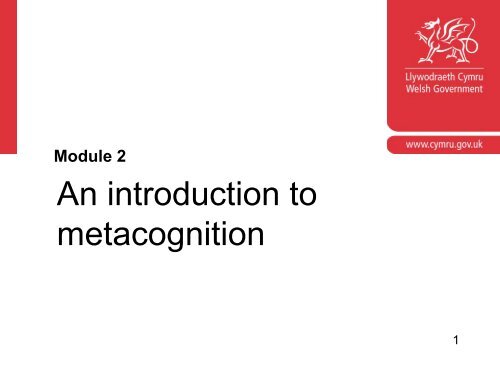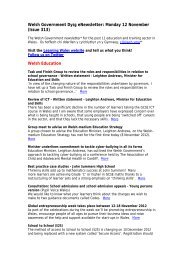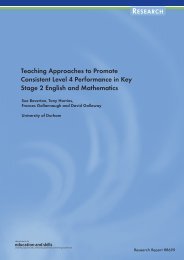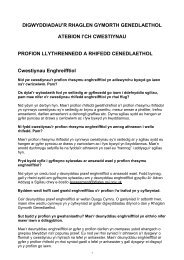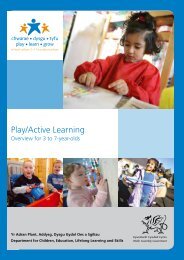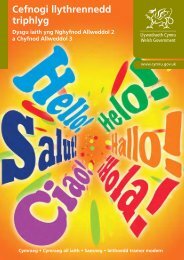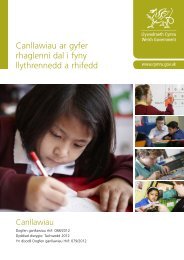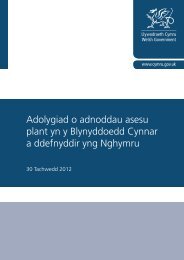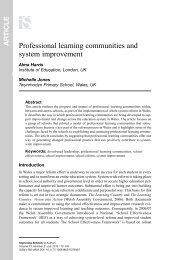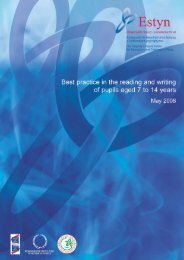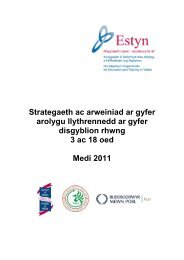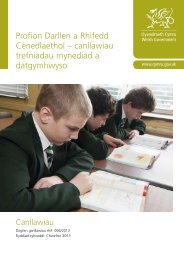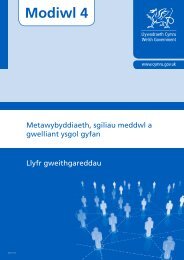An Introduction to Metacognition - Learning Wales - Welsh ...
An Introduction to Metacognition - Learning Wales - Welsh ...
An Introduction to Metacognition - Learning Wales - Welsh ...
Create successful ePaper yourself
Turn your PDF publications into a flip-book with our unique Google optimized e-Paper software.
Module aims• To introduce or refresh colleagues’understanding of metacognition.• To establish a link between metacognitionand PISA.2
What do you know aboutmetacognition?4
A one minute guide <strong>to</strong>metacognition5
The big debate• One envelope per group.• Share out the cards.Be ready <strong>to</strong> feedbackin 9 minutes• Read your card and decide for yourself if you…AgreeUnsureDisagree• Take it in turns <strong>to</strong> read your card <strong>to</strong> the group.• Present your decision and explain yourreasons.• Discuss each card as a group.6
The big debate• How big was your debate?Feedback• Write a ‘Tweet’ <strong>to</strong> describe part of yourdebate <strong>to</strong> everyone else (maximum 140characters).• #metacognition7
<strong>Metacognition</strong> andeffective learningLearners with good metacognitiveskills:• complete work more efficiently• are self-regulated learners, using the ‘right<strong>to</strong>ol for the job’• identify blocks <strong>to</strong> learning and changestrategies <strong>to</strong> ensure goal attainment.8
<strong>Metacognition</strong> andeffective learningLearners with good metacognitiveskills:• are aware of their own strengths andweaknesses• perform better in exams.(<strong>Welsh</strong> Government, Department for Education and Skills, 2012, page 5)9
PISAContexts forlearning(OECD, 2009)11
PISA – contexts for learning• Questions such as the followingshould be used routinely with learnersso that they start <strong>to</strong> internalise thequestion prompts for themselves.12
PISA – contexts for learning• What might this task be about?• Have you seen something like this before?• How is the information presented? What are thekey ideas? Who might use this information?• What strategies might you use <strong>to</strong> extract theinformation you need?• How would you explain this <strong>to</strong> someone else?13
• How do you promote thedevelopment ofmetacognitive skills atpresent?• What small changes canyou make <strong>to</strong> promoteskills further?A small change14
Final thought‘Teaching metacognition is arguablythe most difficult aspect of developinga learner’s thinking. It is, however, oneof the key aspects <strong>to</strong> promoting deeperunderstanding and transfer of ideasand skills <strong>to</strong> all areas of learning.’(<strong>Welsh</strong> Government, Department for Education and Skills, 2012,page 6)15
ReferencesThe Organisation for Economic Co-operation andDevelopment (OECD) (2009) PISA Take the Test: SampleQuestions from the OECD’s PISA Assessments. Available at:www.oecd.org/pisa/pisaproducts/pisa2000/41943106.pdf<strong>Wales</strong>. Department for Education and Skills (2012) A guide <strong>to</strong>using PISA as a learning context. Available at:http://wales.gov.uk/docs/dcells/publications/120629pisabookleten.pdf16
Further readingBransford, J. D., Brown, A. L., & Cocking, R. R. (2000).(Expanded version). How People Learn: Brain, Mind, Experienceand School. Washing<strong>to</strong>n, DC: National Academy Press.Chambers, M., Clax<strong>to</strong>n, G., Lucas, B., Powell, G. (2011). The<strong>Learning</strong> Powered School: Pioneering 21 st Century Education.London: TLO Ltd.Pearce, C. (2011). A Short <strong>Introduction</strong> <strong>to</strong> Promoting Resiliencein Children. London: Jessica Kingsley Publishers.Larkin, S. (2010). <strong>Metacognition</strong> in Young Children. London:Routledge.Tarricone, P. (2011). The Taxonomy of <strong>Metacognition</strong>. London:Psychology Press.17
Web resourceshttp://serc.carle<strong>to</strong>n.edu/NAGTWorkshops/metacognition/teaching_metacognition.htmlhttp://imaginationsoup.net/2012/01/teach-kids-<strong>to</strong>-think-about-theirthinking-metacognition/www.education.com/reference/article/Ref_Dev_<strong>Metacognition</strong>/http://earli.org/special_interest_groups/metacognition18


